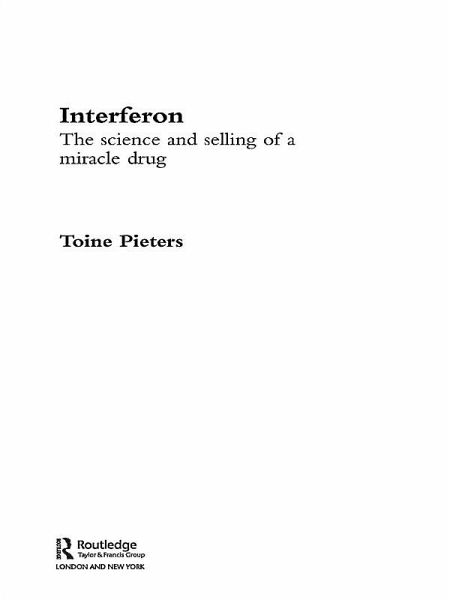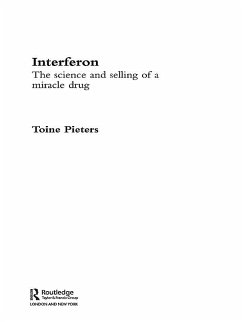
Interferon (eBook, PDF)
The Science and Selling of a Miracle Drug
Versandkostenfrei!
Sofort per Download lieferbar
45,95 €
inkl. MwSt.
Weitere Ausgaben:

PAYBACK Punkte
23 °P sammeln!
This innovative study charts the beginnings, history and fate of Interferon - one of modern medicine's most famous and infamous drugs. Interferon is part of the medical profession's armoury against viral infection, cancer and MS. The story of its development and use is one of survival in the face of remarkable cycles of promise and disappointment as a miracle drug. By telling this story, Toine Pieters' book provides insight into the research, manufacture, and marketing of new bio-molecules that mark modern medical science. Pieters' closely argued book adopts a multi-disciplinary approach in se...
This innovative study charts the beginnings, history and fate of Interferon - one of modern medicine's most famous and infamous drugs. Interferon is part of the medical profession's armoury against viral infection, cancer and MS. The story of its development and use is one of survival in the face of remarkable cycles of promise and disappointment as a miracle drug. By telling this story, Toine Pieters' book provides insight into the research, manufacture, and marketing of new bio-molecules that mark modern medical science.
Pieters' closely argued book adopts a multi-disciplinary approach in seeking to trace the extraordinary voyage of interferon. Through the lens of interferon's voyage, the book explores the interaction of the broad range of actors driving medical science:
*biological and clinical researchers
*the pharmaceutical industry
*high-powered government agencies
*doctors and patients
*the media.
The book demonstrates how research on interferon led to new clinical definitions of cancer and a new rationale for therapeutic use of the drug. Interferon provides a marvellous insight into the development of one of the most controversial drugs of our time. It enhances our understanding of how medicine manufacture and marketing all played a part in pushing back the boundaries of research, from the post-penicillin era to the genetics revolution in medicine.
This study is of particular interest to undergraduates and postgraduates in the fields of History of Medicine, Pharmacology, Medical Genetics and History of Science.
Pieters' closely argued book adopts a multi-disciplinary approach in seeking to trace the extraordinary voyage of interferon. Through the lens of interferon's voyage, the book explores the interaction of the broad range of actors driving medical science:
*biological and clinical researchers
*the pharmaceutical industry
*high-powered government agencies
*doctors and patients
*the media.
The book demonstrates how research on interferon led to new clinical definitions of cancer and a new rationale for therapeutic use of the drug. Interferon provides a marvellous insight into the development of one of the most controversial drugs of our time. It enhances our understanding of how medicine manufacture and marketing all played a part in pushing back the boundaries of research, from the post-penicillin era to the genetics revolution in medicine.
This study is of particular interest to undergraduates and postgraduates in the fields of History of Medicine, Pharmacology, Medical Genetics and History of Science.
Dieser Download kann aus rechtlichen Gründen nur mit Rechnungsadresse in A, B, BG, CY, CZ, D, DK, EW, E, FIN, F, GR, HR, H, IRL, I, LT, L, LR, M, NL, PL, P, R, S, SLO, SK ausgeliefert werden.













